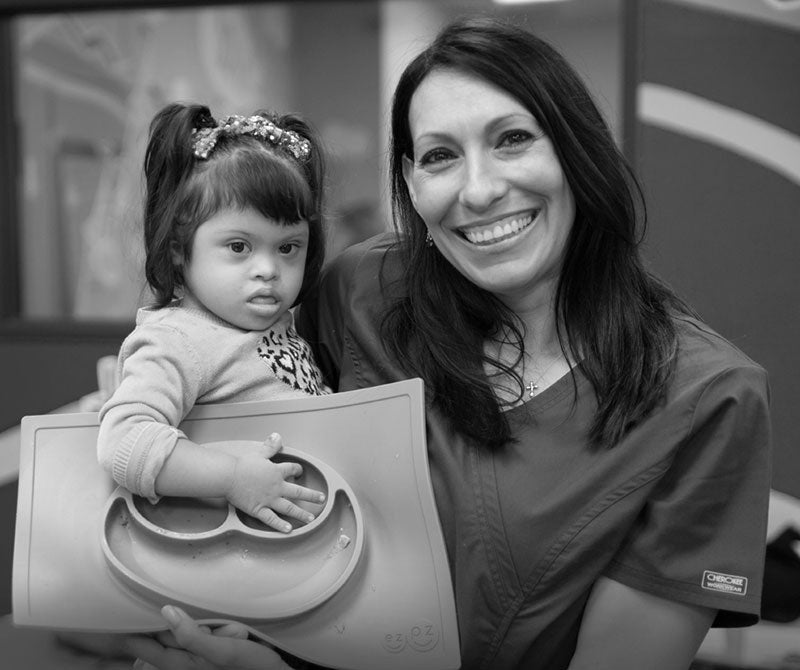Common Mistakes When Teaching Cup Drinking to Babies
Open cup drinking is a messy but important milestone for your baby. As a seasoned feeding specialist, I often see some common mistakes that therapists and parents make when teaching this important skill. Here are three of the most common mistakes I see when it comes to cup training.
Mistake #1: Offering a Sippy Cup
When I ask parents why they purchased a sippy cup, they explain to me that they thought their baby was supposed to transition from the breast to a sippy cup. Unfortunately, this is a feeding myth. Baby should transition from breast / bottle to sips from an open cup (held by a parent).
- Delays: Most families have no idea that a sippy cup may contribute to speech, oral motor and swallowing delays. There are safety concerns, too. A toddler is rushed to the hospital every 4 hours because of injuries sustained from the overuse of bottles, sippy cups or pacifiers. Not only is this painful, it can also lead to mealtime behaviors, trust issues surrounding nourishment, and feeding delays.
- Development: Developmentally, at 6 months of age an infant should start to learn to drink from an open cup (held by an adult). Introducing this feeding milestone at such a young age is mind blowing to some parents! But drinking from an open cup allows baby’s mouth to develop in more mature ways – which is critical for swallowing and speech development.
- Solution: There are NO swallowing, oral motor, or feeding developmental milestones for using a sippy cup with a baby or toddler. But there are for open cup use! So, skip the sippy and try the ezpz Tiny Cup that I designed specifically for infants! The Tiny Cup is an open cup (cup with no lid) made of food grade safe silicone to help babies obtain their drinking milestones.
Mistake #2: Offering the Wrong Size Cup
I have heard countless stories from parents that unknowingly chose the wrong size cup for their baby. Unfortunately, this can result in chronic ear infections, aspiration issues (liquid entering the lungs) and overconsumption of liquids (causing difficulties when starting solids).
- Size: You want to choose an open cup that developmentally fits the size of your child’s face. Most cups on the market for babies are huge, covering their eyes, nose and mouth. Of course, this poses respiratory and aspiration concerns.
- Ounces: At mealtime, we only want babies to consume 1-2 ounces of breastmilk or formula by open cup. This ensures that they will still be hungry and can try a variety of foods. But most open cups marketed for babies are 4-18 ounces, which is inappropriate for a baby’s tiny tummy.
- Solution: The ezpz Tiny Cup is cone shaped on the inside, which provides a safe angle for drinking to help reduce ear infections and aspiration. It is portion sized at 2 ounces in order to provide a developmentally appropriate drinking experience for your baby. The size of the cup is tiny and designed specifically for a 4-12 month-old facial structure.
Mistake #3: Stopping Baby from Using Their Hands or Tongue
I have observed well-meaning feeding therapists and parents stop a baby from using their hands or tongue to explore when teaching open cup drinking.
- Hands: When parents grab a baby's hand to stop them from exploring the cup, some babies may refuse to drink. We need to allow baby to participate in learning with their hands. This will foster a positive relationship with drinking and reduce any future hydration concerns.
- Tongue: Some babies will want to lick, gum and inspect the rim of the Tiny Cup instead of drinking from it. It's important for us to allow this oral exploration to occur. If parents take the cup away, then baby will need to try to lick and explore the rim again the next time we offer it.
- Solution: Introduce the ezpz Tiny Cup between 4-6 months of age (with no liquids in it). This early exposure allows your baby to mouth and play with the cup while learning the fine motor movements needed for future independent cup drinking. This hand-to-mouth practice early on with the cup (and no liquids) will decrease any issues with grabbing or licking the cup when you place liquids in it. Winning!
If you have experienced any of these issues, I hope my therapeutic solutions will offer you a new direction on your open cup journey. Share your drinking success stories with us by using the hashtags #ezpzfun and #tinycup on your social media!
Dawn Winkelmann, M.S, CCC-SLP
SPEECH LANGUAGE PATHOLOGIST & FEEDING SPECIALIST FOR EZPZ
Dawn Winkelmann, a.k.a “Ms. Dawn”, has treated thousands of kids across the globe by helping families overcome picky eating stages and food refusals, while adding new foods into their diet. Her high success rate is attributed to Ms. Dawn bringing her education, experience, sense of humor and her favorite feeding products to the family dinner table.
You will find Ms. Dawn’s expert feeding advice to be positive and fun for the entire family! She adapts complicated feeding/swallowing research and makes it practical and easy for parents! Get ready to learn the science behind your favorite feeding products and ways to bring happy family mealtimes back!



